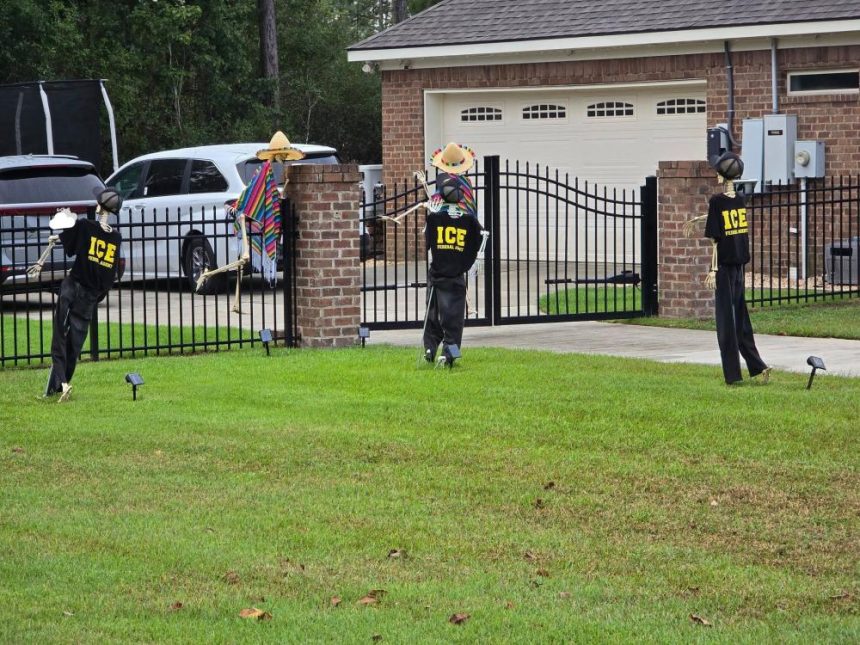A sheriff in Mobile county, Alabama, is facing criticism for putting up a Halloween display that featured two fake skeletons in sombreros and traditional Mexican ponchos being chased over a fence by three skeletal figures dressed in “ICE” T-shirts.
The display outside sheriff Paul Burch’s home has drawn ire online, from neighbors and from Hispanic interest groups.
“It’s hard to put into words how disappointing it is to see our elected sheriff use his own front yard to mock and dehumanize a group of people,” neighbor Whitney Newman said in a response to a Facebook post.
Newman called the scene inappropriate, given the sheriff’s role as an elected law enforcement official, reported Al.com, an Alabama news outlet.
“I don’t think it’s cute or funny. And coming from a law enforcement official makes it exponentially worse. This crosses a line from tasteless joke into a public statement about who deserves dignity,” she said.
Grace Resendez McCaffery, owner of Latino Media Gulf Coast in Pensacola, Florida, said the display was “extremely disappointing and sad” and sent a harmful message.
“It’s questionable whether these are messages that indicate or perpetuate fear, which of course leads to racism,” McCaffery told News 5 WKRG. “Whether it’s done by another immigrant or Hispanic person, it’s still harmful.”
The sheriff’s wife, Michelle Burch, has attempted to deflect any controversy, saying in a written statement to the outlet that she was responsible for the display, describing it as “tongue-in-cheek”.
“My husband had nothing to do with these, other than mowing the grass around them,” she wrote. “I made this one, playing both on my Cuban background and new, needed changes in federal immigration enforcement.”
Burch said she decorated for Halloween and other holidays on a rotating basis of themes: “My parents were legal immigrants, and I have plenty of immigrants throughout my family. I’ll make a new one shortly – we have no shortage of topics to cover.”
The Mobile county sheriff’s department has not commented on the display, but local business groups have pointed to the integrated cultural nature on the Gulf coast.
“The Latin community in Mobile, Alabama, is a vibrant community that contributes to the overall success of the city,” Silvia Lessa Skultety, president of the Hispanic American Business Association of the Gulf Coast, said in a statement.
“For years, we have celebrated the vibrant culture, contributions, and resilience of the Latin community, strengthening Mobile through cultural events, educational initiatives, economic development, and civic engagement.”
The mixed reaction to the Burch family’s display comes days after Donald Trump and other Republicans posted meme videos of Democrats wearing sombreros and handlebar mustaches to illustrate Republican claims that Democrats shut down the government to fund healthcare for undocumented immigrants. Democrats deny the connection.
But the Halloween display in Mobile comes soon after sheriff Burch defended his deputies after they struck a man identified as Henry Castilo. The video showed Castilo being struck in the face as he is being held down by two deputies. Burch told AL.com that Castilo was resisting arrest.
“He decided he wanted to fight the deputies. He was tased twice, which was ineffective, and so they went to a physical altercation where he assaulted the deputy. [He] grabbed [the deputy] around the neck and the vest. And as that fight continued, a second deputy came in to assist,” he said.
The controversy also comes as debate continues over what is and is not considered an acceptable costume for Halloween, traditionally a pagan festival, but increasingly devoted to spooky cosplay that generates about $8bn in economic activity.
Sierra Austin, at the department of women’s and gender studies at Ohio state university, advises that “dressing up like any ethnic/racial group is offensive. Individuals of marginalized/oppressed groups whose identities are trivialized and come with sociohistorical trauma, however, do not have the privilege of ‘taking off’ the oppression they face on an everyday basis.”
In 2018, brands Sephora and Urban Outfitters faced criticism for what some claimed was commodifying Indigenous spirituality and occult magic.
“Problematic white-owned brands market traditional healing methods as nuevo wellness without properly crediting or compensating the cultures that originated the practices. These sacred traditions deserve respect, not monetization,” wrote Jennifer Billock on the Substack Witch’s Kitchen.









